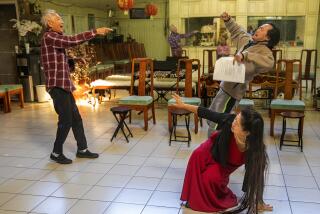Energetic, Stylish ‘Ah Q!’ Explores Dark Themes
- Share via
In China, a man named Ah Q is as well known as Ebenezer Scrooge is here. Like Dickens’ character, Ah Q was created in popular fiction (a 1921 short story by revered writer Lu Xun), and his story in some ways operates as a morality tale. But the self-serving, amoral Ah Q does not undergo a simple conversion and emerge happy and generous like Scrooge. Ah Q represents the baser side of every person--everyone who drops names, names names and thrills at blood sport--and how to deal with that reality remains a thorny affair.
Using this theme as a taking-off point, “Ah Q!,” a short movement-theater piece, was created collaboratively by artists from China and Southern California under the auspices of the Department of World Arts and Cultures at UCLA. It unfolded in tightly crafted, stylized fragments Friday night at UCLA Dance Building’s Theater 200.
Chinese playwright-actor Xu Ying, who narrated, asked questions about what it means to be excited by violence, and added his own memories of communist China’s Cultural Revolution--a suggestion from his major collaborator, postmodern choreographer Victoria Marks, who remained offstage. Actor Dan Froot gave an American yahoo feel to his scenes as the obnoxious Ah Q. Classically trained Liu Ziwei seemed to represent the finer aspects of the human spirit as he danced phrases as finely etched as poetry and as fluid as a bird’s flight.
Three more performers provided a sort of agitprop chorus with exacting idiosyncratic detail, while Liu Qi-Chao’s score supported the drama with bursts of music and feathery flourishes, and the onstage orchestra occasionally joined in abusing Ah Q.
Diverting and sometimes disturbing, “Ah Q!” bristles with the energy of eloquent aesthetic mergings. Since the performance often seems as much about personal journeys as it is about Ah Q, it might benefit from the inclusion of even more re-creations of the process (discussed in a post-performance talk) in the product. Common ground is not easy to find, and sometimes the struggle for it is the most telling part of the story.
More to Read
The biggest entertainment stories
Get our big stories about Hollywood, film, television, music, arts, culture and more right in your inbox as soon as they publish.
You may occasionally receive promotional content from the Los Angeles Times.










